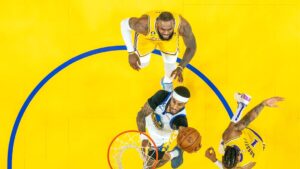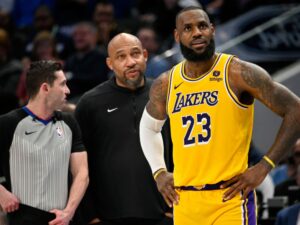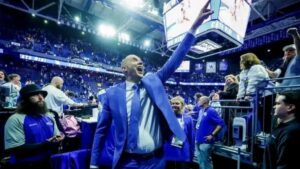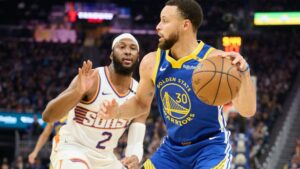
General Thought: mind battling! Can Lakers ‘sicko’ JJ Redick change the way NBA teams think about coaches?…
JJ Redick’s appointment as the LosAngeles Lakers’ head coach has prompted discussions about reimagining the criteria for NBA coaching roles. Redick, a former NBA player and TV analyst, had no prior coaching experience when he joined the Lakers. Yet, his analytical approach, understanding of modern basketball strategies, and emphasis on player development have made an immediate impact.
This piece explores whether Redick’s success could inspire teams to prioritize tactical insight and relatability over traditional coaching resumes, potentially opening the door for a new era of “outsider” coaches in professional basketball.
Redick’s “Sicko” Mentality and Innovative Approach
The label of “sicko,” a term associated with obsessive passion, has been used to describe Redick’s commitment to understanding the game. Known for his sharp analysis as a broadcaster, Redick has taken a data-driven approach with the Lakers. His coaching philosophy prioritizes efficiency, specifically embracing three-point shooting, dynamic player roles, and versatile offensive strategies.
For instance, Anthony Davis is now featured as an offensive hub, while LeBron James’ screen-setting and decision-making have been integrated more systematically. These adjustments aim to optimize each player’s strengths while fostering team cohesion.
Moreover, Redick has implemented structured rotations, favoring a consistent nine-man lineup. This consistency allows players to better understand their roles, improving performance and morale.
The shift contrasts with previous Lakers coaches, who relied on broader, less defined rotations. Redick’s focus on defined roles and analytics reflects a forward-thinking approach that values clarity and precision in decision-making.
Breaking Traditional Coaching Norms
Historically, NBA coaching hires have emphasized prior coaching experience, either at the collegiate or professional level. Redick’s appointment represents a break from that tradition, favoring intellectual and communicative skills over an established coaching pedigree. As a former player, Redick brings a unique blend of relatability and tactical acumen. His ability to connect with players while leveraging modern basketball philosophies offers a fresh template for coaching success.
This shift aligns with broader trends in professional sports, where analytical insights are increasingly shaping decision-making.
Coaches like Redick, who embrace these tools, may challenge the perception that only career coaches can succeed at the highest level. Instead, teams might begin prioritizing candidates with a deep understanding of the game, even if they lack traditional coaching credentials.
Challenges to the Outsider Model
Despite Redick’s early success, the outsider model faces potential hurdles. Coaching requires more than just strategic acumen; it demands leadership, conflict resolution, and adaptability. Critics argue that Redick’s transition from player to coach might not account for the full range of challenges inherent to the role, including managing egos and navigating crises.
While Redick’s player experience helps him connect with his roster, it remains to be seen whether his approach can sustain long-term success.
Additionally, the NBA coaching ecosystem is deeply entrenched, with a preference for established networks and career pathways. While Redick’s success might inspire more unconventional hires, systemic resistance could limit the extent of this shift.
Redick’s Broader Influence
If Redick’s innovative methods yield sustained success for the Lakers, they could influence how teams evaluate coaching candidates.
This change may particularly appeal to franchises seeking fresh perspectives or those operating in smaller markets with fewer resources. Teams might begin scouting candidates with strong analytical backgrounds, communication skills, and modern basketball philosophies, regardless of traditional coaching experience.
This trend could also extend beyond the NBA, influencing hiring practices in other professional leagues. As sports organizations continue to embrace data-driven decision-making, the value of intellectual flexibility and relatability may increasingly outweigh conventional qualifications.
JJ Redick’s role as the Lakers’ head coach has already disrupted traditional narratives around NBA coaching. His early success demonstrates that innovation, analytical thinking, and player-focused strategies can thrive even in one of the league’s most scrutinized roles. While challenges remain, Redick’s influence may inspire a new era in professional basketball, where coaching potential is defined not by resume length but by vision, adaptability, and a commitment to excellence. As Redick’s journey unfolds, it could reshape how teams approach leadership in a rapidly evolving sport.







